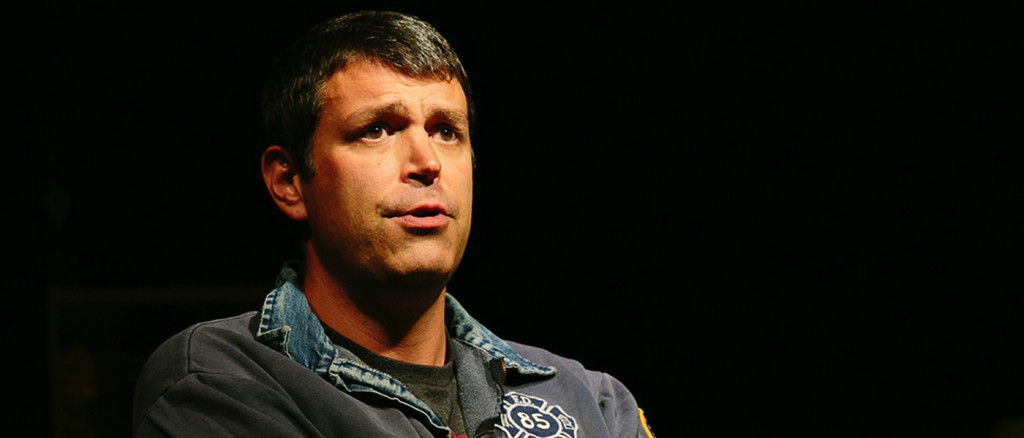Despite the plural in the title of Anne Nelson’s two-character, 80-minute play The Guys, we see only one man on stage: Nick Flanagan (played by Nathan Faudree) of the New York City Fire Department. A few days after the Sept. 11, 2001, catastrophe he meets with an experienced journalist, Joan (JoAnne Rougeux), to craft a eulogy for eight of his comrades, out of the 350 who had been obliterated in the World Trade Center collapse.
The ultimate goal might be to get fire captain Nick to express his grief. But as this area premiere from Central New York Playhouse proceeds, he first has to come to terms with his stunned sense of loss.
Joan speaks first, breaking through the fourth wall. We learn that although she hails from Oklahoma, she dwells in a more privileged station than the firemen. Now a resident of Brooklyn’s fashionable Park Slope, Joan’s taste and values differ from those of blue collar workers. She rejoices that her husband prefers opera to football, and there’s a volume of Seurat on her coffee table. Having covered Latin America on her beat, he looks at Nick’s world of ladders, engines and church picnics as a new country to be discovered. She continually marvels how much people on the street, like Nick, are unknown, and how deep we can go when we peel away the layers.

The date of the action in The Guys is Sept. 26. The suddenness of the attack and the enormity of the deaths, then not fully numbered, leaves Nick numb and nearly speechless. Faudree, often an ebullient player, deftly handles Nick’s emotive unresponsiveness. When he begins to iterate his pals, he underplays his regard for them and their shared affections. Of the first, Bill Doughterty, he allows, “Ah, he’s a schmoe. He’d come into a room and you wouldn’t even notice him.”
Joan, significantly a journalist and not a counselor or a clergy person, brings a different insight. She remembers that when victims of state torture in South America’s “dirty wars” came to tell their tales, they dreaded speaking of their horrors to family and loved ones for fear of upsetting them and so spoke into tape recorders. Joan makes herself such a vehicle, constantly scribbling in a spiral notebook. Only she does not merely transcribe his words but rather his full meaning. When she reads to him what she has written, or he grabs the notebook himself, he recognizes her words as his true feeling.
Some early commentators on The Guys seized upon Nick’s ethnicity and the Irishness of many of the men, even though an important one was German and another Hispanic, Hippolito Diaz, “sounds like a ballpark.” Such a view would argue that the Irish are more prone to shield their emotions, as opposed to, say, blacks or Italians. Director Patricia Catchouny does not buy into this. One could also point out that a male faces death and a woman helps him to deal with it.
There are also class differences. Joan is a card-carrying member of the liberal elite who is learning to respect working men’s manly values. Nick and his mates give high regard to physical skills, like Barney, the amateur metalsmith. They see a certain suppression of self required to take charge, the profound difference between a boss and a leader.
Gender differences aside, there is no suggestion of romance between two married people. Joan obviously admires Nick’s courage as well as his drive to improve himself. In The Guys’ most engaging moment she imagines his completion of tango lessons, “the hardest one of all.”
JoAnne Rougeux wears Joan’s educational and social privilege well. She is empathetic and not haughty. Traveling a much longer arc, Nathan Faudree has a splendid outing in The Guys. The eulogy with which Nick concludes the show is eloquent, touching, honest and manly.
Central New York Playhouse partners with Raymour and Flanagan, 3430 Erie Blvd. E., for a blood drive on Sept. 11, 10:30 a.m. to 3:30 p.m. Blood donors will get free tickets to any upcoming production, including that evening’s performance of The Guys. Call 885-8960.
The Guys continues with 8 p.m. performances Thursday, Sept. 4, through Saturday, Sept. 6, and Thursday, Sept. 11, at Central New York Playhouse in Shoppingtown mall.



